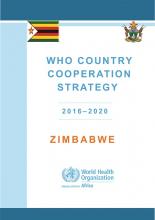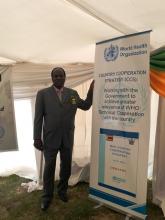Launch of WCO/Zimbabwe CCS and the National Health Strategy
Murewa, 25 January 2017 - WCO/Zimbabwe’s 3rd generation Country Cooperation Strategy (CCS 2016-2020) was concurrently launched with the National Health Strategy (NHS 2016-2020) at a huge event held at Murewa District Hospital. The joint and colorful function, was attended by many players in health – including senior Government officials, parliamentarians, civil society organizations and members of the local communities in Murewa District; as well as health development partners and donors.
The joint occasion was a deliberate move because the 2 strategies are aligned to and complement each other. The launch in a hospital setting provided participants with the opportunity to reflect on the challenges facing the health sector – from the obvious weak funding base for service delivery, to staff shortages in key departments. Nonetheless, the local authorities were optimistic and appealed to Government to prioritize the District in implementing the new strategies.
Introducing the CCS during the launch function, Dr Stanley Midzi (NPO/HSS) pointed out that the priority actions identified in the CCS are fully aligned to MOHCC mission of achieving equity and quality in health through universal health coverage (UHC). He emphasized that the CCS is hinged on provision of advisory and technical support within the SDGs spirit of universality and leaving no one behind. Dr Midzi urged all health stakeholders in Zimbabwe to familiarize themselves with the CCS, so as to appreciate WHO focus areas in supporting the NHS in the next five years.
Based on the outcome of the various consultations undertaken, WHO will concentrate its broad strategic cooperation agenda over the next five years in five priority areas: (i) achieving and sustaining universal health coverage (UHC) through strengthening of health systems; (ii) accelerating achievement of the unfinished MDGs relating to reduction of maternal, new-born, child and adolescent mortality; and strengthening sexual and reproductive health; (iii) further reducing the burden of HIV/AIDS, tuberculosis, malaria, neglected tropical diseases, hepatitis, and other communicable diseases; (iv) strengthening and re-orienting health and health-related systems to address the prevention and control of NCDs, including disabilities, injuries and mental health disorders; and (v) strengthening preparedness, surveillance and effective response to disease outbreaks, acute public health emergencies and the effective management of health-related aspects of humanitarian disasters in order to improve health security.
To implement this CCS, WHO’s actions will focus on provision of advisory and technical support to the MOHCC and other stakeholders in the development of policies, guidelines and protocols; advice and support in development of robust community involvement strategies; advocacy for health; resource mobilization; and facilitation and brokering public-private partnerships.
Speaking on the NHS, Dr Okello said the full implementation of the NHS should go beyond the boundaries of health systems, and address the social determinants of health and the interaction between the health sector and other sectors in society, and should play a significant role as a tool for resource mobilization, and increasingly become relevant in improving aid effectiveness. He also said the NHS will only be of value to the population if it is fully implemented, and urged the relevant authorities in the Government to increase the health sector's allocation of funds and the employment opportunities based on the current needs - in order for the health services to enhance its quality, efficiency and effectiveness. On the link between CCS and NHS, he said the CCS is WHO/Zimbabwe’s own internal effort to identify areas in the NHS where WHO’s input could make a difference, based on WHO comparative advantage.
There was great solidarity from the entire UN family, with the participation of UNICEF, UNDP, UNFPA, and UNAIDS. This is an indication of the importance they place on the work of the UN in support of the Government. Speaking at the function, the UN Resident Coordinator, Mr Bishow Parajuli said the National Health Strategy is an important document that lays out the Government’s vision for health and well-being of the Zimbabwean people and provides the basis for the UN and Development Partners to play their role in supporting national efforts. “Our goal is to see an improvement in the health status of every Zimbabwean, and to see Zimbabwe achieve its national health goals and fulfil its commitment to the Agenda 2030 and the Sustainable Development Goals,” said Mr Parajuli. Bilateral partners like DFID, EU, Sweden and others were also present.
In launching the 2 strategies, the Honourable Minister of Health and Child Care, Dr David Parirenyatwa said the 2 strategies tackle some of the critical health issues like moving towards UHC; curbing the spread of neglected tropical diseases; re-orienting conventional care towards people-centred care, integrating health in all policies, and the critical shortage of nurses, doctors, and other health personnel in health institutions.
The Ministry of Health and Child Care also launched addendums to the NHS, namely the District core health services for Zimbabwe, and Costing of the NHS. Dr Parirenyatwa said NHS 2016—2020 is the first NHS to be costed and this will make resource mobilization and the coordination of Donor support easier. “With the documents that were launched today, if fully implemented, the future of health in Zimbabwe looks promising,” said Dr Parirenyatwa.








